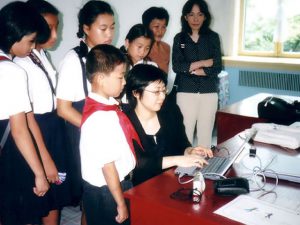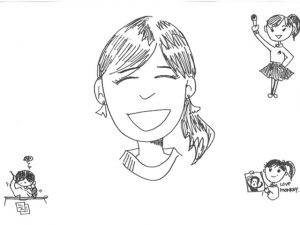[Original by Haruka SHIMIZU, 2015 Public Relations Intern (March 23, 2016); Translated by K. Adachi/R. Florea]
[*Ms. Teranishi recently moved to AYUS, another NGO working for international cooperation (http://ngo-ayus.jp).]
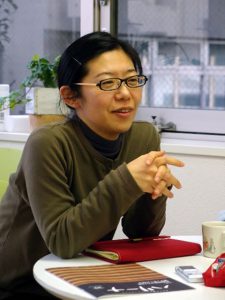
She never expected that NGO would be her working place, because she thought NGO was a place where special people work.
Hello, my name is Haruka Shimizu. I am a PR intern for JVC. In today’s staff interview, we have Ms. Teranishi who is described as a “Caretaker of JVC” by Ms. Namiki who is in charge of the Palestine project. Ms. Teranishi is not only in charge of the Korean project, but also in charge of taking care of interns every day. She is an unsung hero. She seldom speaks about herself because she is shy. Other staffs don’t know much about her in details. I am going to carefully listen to her story this time.
You look a sincere and reliable person. How did you spend your childhood?
I was a child who didn’t like physical education class in elementary school. I had little chance to exercise, because I was given a lot of books at home by my parents. I was relatively small in my class, since I was born after 1st January(*1). Those who are born between 1st January and 1st April are called HAYAUMARE (born early) in Japan. So I felt disappointed when I was not able to do things in the same way as other children did. Even though we lived in Kanagawa prefecture, we went to stay at a hotel in Tokyo on summer family trip. My father said that many families in Tokyo would go to countryside during “OBON”, a week middle of August, to pay respect to ancestors. There would be less people in Tokyo. I explored secondhand bookstores in Kanda or electric town in Akihabara. I have no brothers and sisters and I am HAYAUMARE. I wasn’t very good at communicating with friends of the same age in playing or doing sports. I didn’t even have common subjects to talk to friends. Due to these past experience, I now enjoy very much talking to people at JVC with different backgrounds and of various generations.
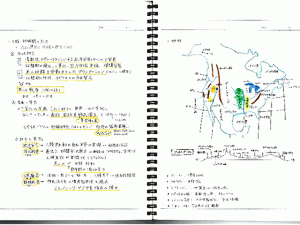
This notebook shows her character. Beautiful letters and a clear map! It is hard to believe that they were written by a 1st year student of high school.
When I entered high school, I still didn’t like physical education classes. So I joined the newspaper club, because it was not necessary for the members of this club to participate in the annual long-distance running competition at school. I was in charge of writing articles, for example, about school clubs. I also interviewed the graduates of our high school, who played in J.LEAGUE, the professional football league. I sometimes went to Kanagawa Newspaper Company in Yokohama, which edited and published our school newspaper. I was happy to skip classes, taking days off officially, and to go to Minatomirai. I went out to a pizza buffet with other members. We called it a tradition of the newspaper club. The Yokohama Landmark Tower was just built at that time. We introduced it in our article, too. We were visiting local shopping areas in order to get advertisements. It was an important activity.
(*1)The school year of Japan starts on 2nd April and ends on 1st April next year [Note added in the English version].
When did you become interested in foreign countries?
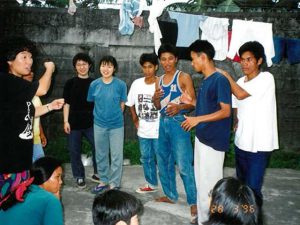
She sympathized with the approach of JVC to “learn each other”, not to “give support”. It was also due to her experience at that time that one could do only a little thing (she is the second from the left).
Looking back now, it might be the class of geography in the first year of high school. I learned about many ethnic groups in the world. The teacher didn’t use any textbook in the first semester and just told us his interest. I first became interested in the diverse ethnic groups in China. That might explain why I keep an interest in the East Asian region up to now.
I entered the department of regional culture in university and started to think of going overseas to experience something unusual. I happened to find a study tour to Philippines. The tour was mainly to interact with youth in Philippines, and I had a chance to talk with Filipino of my generation. Since they were already working, we had a conversation at break. It made me think about my life rather than foreign culture. I realized that how much I was supported by my parents. After coming back to Japan, I sometimes met people who were in the same tour. I also sold banana juice in an event organized by the NGO that took me to the Philippine tour.
What made you decide to go to Korea for an exchange study, when you were a university student?
I didn’t expect that I would go overseas, because I wasn’t good at English. On the other hand, I was keen to acquire at least one foreign language. I was wondering if I should take Chinese or Korean as the second foreign language. I finally decided to take Korean, because I thought it would be easier to acquire the language if students were less in a class. When I was the third year student, the teacher told me that there was a vacancy for an exchange study. Korean wasn’t so popular as present. I decided to go to Korea. To be honest, I appreciated that I could postpone my graduation, rather than I could learn in Korea.
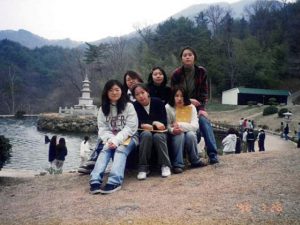
She visited ruins in the class of the department of history. She found strong connection between Korea and Japan from old times (center in the back row).
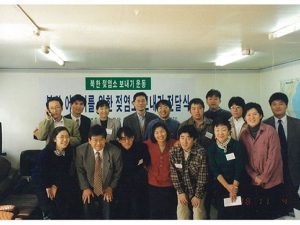
She met Mr. Kumaoka, the former representative of JVC, in Korea. She was a university student. How cute she was (left in the front row).
I studied at a university in Seoul. I chose to enter the department of history, since I heard that one could do fieldwork in summer and autumn, travelling through Korea and having a look at ruins. There were no Japanese students in the university. Those who could speak Japanese were Korean students in the Japanese language faculty only. It was an ideal environment to learn language. But I was almost crying sometimes, because there were no classes to learn Korean for foreign students. It was so hard to study history and pass the exams together with Korean students who had struggled to pass the university entrance exams. I was gradually accustomed to the university in the second semester, and found a class of “Understanding about North Korean society.” I wanted to know how Korean people think about North Korea. I noticed a gap between elder and younger generations of Koreans. Elder Koreans had in common the idea to unite South and North Korea. Koreans of my generation, however, said that the South and North Korean are of the same ethnic group but of different nations.
How did you spend life in Korea?
I lived in a dormitory of a female university, where the curfew was very strict. I always came back early to the dormitory, because the chief of the dormitory called the names of students to confirm the presence and closed the entrance at 11pm. After that, everyone gathered in public space and watched drama or football on TV.
One day, the representative of Japanese NGO that organized the study tour to Philippines told me that they would visit Korea. I was given an opportunity to meet them. This NGO also supported North Korea, and hence we met at a Korean organization that supported North Korea, too. I gradually got to know that there were various connections between NGOs. I thought before that it would be impossible for international NGOs to work in Korea. There I met Mr. Kumaoka, the representative of JVC at the time.
By talking with various people, I learned that a famine took place in North Korea around 1995, caused by natural disaster like heavy rain and flood. A lot of donations and supports were organized in Japan, too. It was pure humanitarian aid aiming to help people in trouble of a neighboring country. The situation of North Korea was not known well in Japan at that time. I heard that a Japanese collected a lot of rice across Japan to send it to North Korea. He/she was born in Hyogo prefecture and knew that North Korea gave support when the Great Hanshin-Awaji Earthquake hit there in 1995. He/she wanted to send rice to North Korea in return. I was also surprised to know it. I only knew that the relationship between Japan and North Korea was dramatically deteriorated when North Korea launched the missile “Tepodon” toward Japan in 1998.
How did you spend time after coming back to Japan?
I started job hunting after returning to the university. However, I missed the chance, because I did it in my own way without knowing the process of job hunting. All my friends in the university had already graduated. Introduced by my acquaintance, I started a part-time job in a library, which had a lot of books related to oriental history. My job was to input the contents of thousands of books written in Korean into the computer database. It was a demanding job, but I was happy to work there, because people familiar with Mongolia and Eurasian continent were working together. In addition to the job, I spent time in my university to write a thesis and went to NGOs sometimes.
I visited JVC for the first time around the time of my graduation. I was asked to help printing materials for an international conference on humanitarian aid to North Korea. Then Mr. Kumaoka asked me, “Will you work here a couple of days a week?” In the beginning, I came to JVC like an intern continuing the part-time job at the library. After that, my responsibility for the job in JVC has gradually increased and now I am working here.
What is the charm of Korean language?
It is the pleasure of communicating with each other, isn’t it? This would be the same for other languages. The language skill improves, if one has a person to whom one wants to talk. In my case, vague curiosity to Asia made me choose Korean. Another reason could be that I was not good at English. I could continue learning Korean since I met wonderful people through the language. Although there is complicated historical background between Japan and Korea, I personally had no bad experiences or negative images to Korea. I believe it is important to have good encounters.
You usually take small memos in Korean, don’t you?
Hahaha. When did you see it? I use Korean when complicated Japanese Kanji bothers me. And I just simply love Korean letters. I still listen to old K-pop. But I avoid watching Korean drama because, once I start watching, I cannot stop and cannot sleep.
Finally, can you please tell us what you feel when you visit Korea and future prospects of the Korean project?
Since I only visited Pyongyang these years, I don’t know the overall picture, but I feel young generations are energetic. I met many students, who believe that their country would be developed from now on. They want to devote themselves to the country. Young people tend to focus on their own success, but I hope that the vitality of this young generation would be utilized.
It passed 15 years since “Exhibition of friendship between South and North Korea and Japan” started. It is one of the activities of JVC, which gives an opportunity to meet someone whom you cannot meet in reality but through paintings. It is difficult to foresee the end of our project, since the gap between Japan and North Korea is getting bigger or even inducing indifference among people of both countries. Although the situation may not change immediately, we need to make efforts to change it. We cannot change the past and therefore we should think of the future. The distance from Tokyo is shorter to North Korea than to Okinawa, yet we cannot easily go back and forth between Japan and North Korea. We miss a lot of opportunities to make use of this geographical advantage. I believe that many things will change, if people can travel each other.
What do I feel about South/North Korea when I am there? …. I don’t feel anything special. You may find many things unusual there, since available information is limited. But the people have their own daily life. When I think of the division of South and North, I feel sad as a Japanese. The culture and habits have been greatly changed even though these countries used to be a united country. People cannot see each other, even though their lands are located next to each other. I am relieved, however, that the people have similar character to ours. The Japanese may think that North Korean people are uniform and coldhearted, but they love drinking and are passionate. They easily start singing and dancing. They are compassionate and responsible. They keep promises and cherish the relationship once established. I didn’t know such things until I visited there.
[My impression after the interview]
She is neat and, at the same time, has passionate and sincere thoughts on North Korea and Asian countries. I sympathize with her that she couldn’t speak or move like other children. I am also HAYAUMARE.
[Notice for the next interview]
The next staff member for our interview is “Little head great wit” as Ms. Teranishi puts it. She is small but always stimulates staff members of JVC. Please stay tuned for the next interview.
* The order of uploading the English version of “Staff Interview” is random and hence different from the order of the original Japanese version. We are sorry, but the person coming next may be different from the “next person to be interviewed” mentioned in the text.
Share This:
